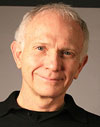| |
|
|

|
|
ATLAS |
|
|
Assistive
Technology
Laboratory
at
Stanford |
|
|
|
Technology and
design benefitting individuals with disabilities and older adults in the local
community |
January 11, 2014 |
|
|
|

Welcome to this edition of Perspectives,
the e-newsletter of the
Stanford course,
Perspectives in Assistive
Technology.
This issue invites you
to attend the next class session and
encourages your participation in the
course's assistive technology
faire.
What is
the course? - Perspectives in Assistive Technology is a
Winter Quarter course at Stanford that explores the design, development, and
use of assistive technology benefitting people with disabilities and older
adults. Much more information can be found on the course website. Student enrollment in the course seems
to have stabilized at 48.
Invitation to attend - You are invited to attend
all class lectures. They will be held in the
Thornton Center - Classroom 110 on Tuesday
and Thursday afternoons at 4:15 to 5:30pm and are free and open to the
public.
Next class session - Tuesday, January 14th at
4:15pm:
|
 
|
Need Finding for Assistive
Technologies
Gayle Curtis 1 &
John C. Tang, PhD 2
1 UX Design Consultant & 2 Microsoft
Research |
|
Abstract: When we look
at the drivers of innovation we see two complementary themes emerging: new
technologies or methods that open the way to new solutions, and new insights or
experiences that bring a better understanding of the problem. With a design
thinking approach, we first look to build empathy with the user and the
situation, then we use ideation, prototyping and iteration to explore,
formulate, and test solutions. |
|
In this class session we will
go into more depth with the candidate projects and build our understanding of
the problem areas. We want to learn more about the user needs, goals, and
values around the problem, as well as the constraints and requirements of the
situation itself. One goal for this session is for you to identify a set of
questions that you want to address through interview and observation with real
users of assistive technologies, as well as some good ideas about people that
your team might talk to and work with to inspire both innovation and relevance
for your project. |
Biosketches
|
Gayle Curtis is a
design consultant in the San Francisco Bay Area, specializing in user interface
architecture and design strategy for online ventures and interactive products.
Recently he was Principal Interaction Designer at Yahoo!, where he developed a
practice area in strategic ideation and disseminated it through workshops in
the US and Asia. At Stanford he has taught courses in HCI and Product Design.
Gayle is a graduate of the Engineering Product Design program at
Stanford. |
|
John C. Tang is a
Senior Researcher at Microsoft Research where he designs and studies new tools
to support distributed collaboration, which he uses to connect with his
research team up in Redmond, WA from Silicon Valley, CA. John's approach
combines understanding users' needs through social science methods with
designing and prototyping new technologies. John graduated from the Design
Division at Stanford University. |
|
Would you like to participate in the assistive technology
faire? - This repeat event -
scheduled for Tuesday, February 11th - will provide an opportunity for
students and community members to get an up-close look at a variety of devices
and learn about available services. If you are a vendor of assistive technology
products or supply assistive technology services and would like to participate,
please contact me. Everyone is welcome to attend the faire. |
Would you
like to support the course? - Funding in any amount for the course
and student projects is always welcomed. Monetary gifts support approved
project expenses, administrative costs, honoraria for guest lecturers, and the
end-of-term celebration. Refer to the Team Project
Support webpage for more information.
Please contact me if you have any
questions, comments, or suggestions about the course and thank you again for
your interest.
Dave

Do you
have a question or comment? - David L. Jaffe, MS, the course
instructor, can be reached by email
or at 650/892-4464.
To unsubscribe from this
newsletter, please email Dave. |





